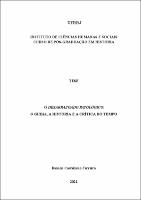Please use this identifier to cite or link to this item:
https://rima.ufrrj.br/jspui/handle/20.500.14407/10097| Tipo do documento: | Tese |
| Title: | O desarrazoado patológico: O Guesa, a história e a crítica do tempo |
| Other Titles: | The pathological unreasonable: O Guesa, the history and criticism of time |
| Authors: | Ferreira, Ramon Castellano |
| Orientador(a): | Teixeira, Rebeca Gontijo |
| Primeiro membro da banca: | Teixeira, Rebeca Gontijo |
| Segundo membro da banca: | Oliveira, Maria da Glória de |
| Terceiro membro da banca: | Amaral, Sergio Alcides Pereira do |
| Quarto membro da banca: | Rodrigues, Henrique Estrada |
| Quinto membro da banca: | Nicolazzi, Fernando Felizardo |
| Keywords: | O Guesa;Sousândrade;História;Experiência do tempo;Crítica |
| Área(s) do CNPq: | História |
| Idioma: | por |
| Issue Date: | 1-Dec-2021 |
| Publisher: | Universidade Federal Rural do Rio de Janeiro |
| Sigla da instituição: | UFRRJ |
| Departamento: | Instituto de Ciências Humanas e Sociais |
| Programa: | Programa de Pós-Graduação em História |
| Citation: | FERREIRA, Ramon Castellano. O desarrazoado patológico: O Guesa, a história e a crítica do tempo. 2021. 155 f. Tese (Doutorado em História) - Instituto de Ciências Humanas e Sociais, Universidade Federal Rural do Rio de Janeiro, Seropédica, 2021. |
| Abstract: | O objetivo desta tese é investigar a elaboração da experiência do tempo no poema O Guesa para a constituição de sentido da história da América e do Brasil. A estratégia utilizada consiste na análise dos recursos linguísticos empregados na construção das tessituras temporais do poema e da relação que os mesmos assumem na composição do enredo épico. A fim de compreender este investimento narrativo, a pesquisa acompanha a travessia existencial e transcontinental do personagem Guesa pelos doze cantos da epopeia, onde, misturado à voz do narrador épico, o peregrino vai tecendo avaliações críticas acerca das realizações da modernidade e da colonização ibérica nas Américas, bem como a respeito do Segundo Reinado. Em que pese o papel preponderante destas críticas no enredo épico, a hipótese inicial desta tese é a de que a epopeia O Guesa não se resume a essas denúncias, consistindo as suas duas descidas ao inferno numa arte combinatória que abre um vasto campo dramatúrgico a partir do qual torna-se possível pensar outras configurações e representações para a história do Brasil e da América. |
| Abstract: | The aim of this thesis is to investigate the elaboration of the experience of time in the poem O Guesa for the constitution of meaning in the history of America and Brazil. The strategy used consists in the analysis of the linguistic resources used in the construction of the poem's temporal textures and of the relationship they assume in the composition of the epic plot. In order to understand this narrative investment, the research follows the existential and transcontinental journey of the character Guesa through the twelve chants of the epic, where, mixed with the voice of the epic narrator, the pilgrim make critical assessments about the achievements of modernity and the Iberian colonization in the Americas, as well as regarding the Brazil’s Second Reign. Despite the preponderant role of these criticisms in the epic plot, the initial hypothesis of this thesis is that the epic O Guesa is not limited to these denunciations, its two descents into hell consisting of a combinatorial art that opens up a vast dramaturgical field from which it becomes possible to think of other configurations and representations for the history of Brazil and America. |
| URI: | https://rima.ufrrj.br/jspui/handle/20.500.14407/10097 |
| Appears in Collections: | Doutorado em História |
Se for cadastrado no RIMA, poderá receber informações por email.
Se ainda não tem uma conta, cadastre-se aqui!
Files in This Item:
| File | Description | Size | Format | |
|---|---|---|---|---|
| 2021 - Ramon Castellano Ferreira.pdf | 2021 - Ramon Castellano Ferreira | 1.73 MB | Adobe PDF |  View/Open |
Items in DSpace are protected by copyright, with all rights reserved, unless otherwise indicated.

